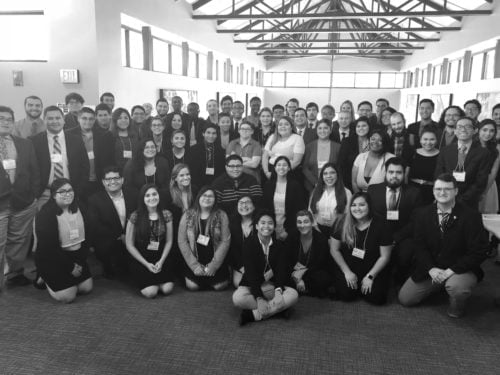What started as a regular class for Political Science Majors has grown into an organization that is quickly rising in numbers and support. Texas A&M University’s (TAMUK’s) Model United Nations hosted its first on-campus conference on April 14 and 15.
In a span of one year, Model U.N. went from a class to an organization – Javelina Model U.N. The organization was first proposed in the fall of 2017 by Assistant Professor of political science Chika Rosenbaum and few of her students from her Model U.N. class.
By January, the members of Javelina Model U.N. began planning the conference. It took two months of recruiting, workshops and scheduling. Nearly 60 participants were recruited for the conference including students from TAMUK, Texas A&M University-San Antonio (A&M-SA), and the University of Texas at San Antonio (UTSA)
The workshops introduced participants to the basics of Model U.N. Participants learned that Model U.N. is a simulation of the United Nations, which is made up of countries throughout the world who resolve global issues. Each person is assigned the role of a delegate for a country.
The student delegates are then divided into committees who will draft resolutions for the issue assigned to their committee.
Despite a few technical setbacks, the Javelina Model U.N. members consider the council a success. Based on a survey conducted by the Javelina Model U.N., 100 percent of participants enjoyed the conference, 89 percent would come back next year, and 62 percent would like to become a Model U.N. member.
Rosenbaum was astounded by the amount of smiling faces at the conference.
“You don’t see that (smiles) in a classroom…When you see that at the conference, it gives me a good signal that everybody is enjoying it and learning something in a fun way,” Rosenbaum said.
The conference received a lot of support from the Interim Department Chair of History, Political Science and Philosophy Jeff Glick; Professor Nirmal Goswami; and former Political Science Lecturer Richard Hartwig. Goswami said the conference had great enthusiasm, participation, and professionalism.
Head Research Assistant for the Model U.N. conference and Associate Chair of Economic and Social Council Kristen Hake is pleased with the work done by the Javelina Model U.N. team. Although Hake will be graduating, she is grateful for the friendships and bonds she has made.
“What I’m most proud of is the fact that we (Javelina Model U.N.) pulled it together in a really short amount of time. We all worked extremely hard.”
At the conference, the participating delegates tackled the subjects of climate change, organized crime, and the displacement of people.
The delegates were split into different councils. To create tension in the councils, the chair members posted fake breaking news, such as Twitter posts from President Donald Trump.
The conference was not limited to only participation from political science majors. Various majors, including engineering and pre-health, attended as delegates.
Roger Garcia, TAMUK criminology and political science major and the delegate of Venezuela at the Model U.N. Conference, thought that his criminology major came in handy when tackling his assigned topic.
“I got to use both of my majors for the organized crime resolution and I was happy that it passed, and that I got a lot of countries to work together,” Garcia said.
On the final day of the conference, delegates were given awards such as the best overall delegates and the most diplomatic delegate.
Vice President of Model UN Society and Chair of Economic and Social Council Ethen Peña was very impressed with the amount of people who attended the conference.
He was surprised at the positivity the San Antonio colleges gave to TAMUK.
“We had students from UTSA tell us they were very impressed with our school and our department. Specifically, our faculty like Dr. Rosenbaum and Dr. Glick …,” said Peña “That was a beautiful thing for me. To have other people come here and experience the Javelina love…”
Javelina Model U.N is already making plans for another conference next year.
They are seeking to make the conference a three-day affair rather than a two-day event.
“All of this is because of Doctor Rosenbaum. She is really the star …She did the grants necessary to pay for this,” Peña said.
